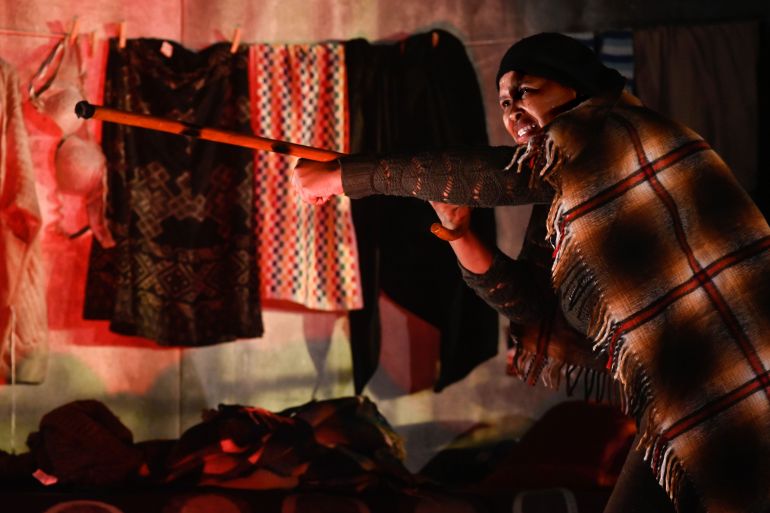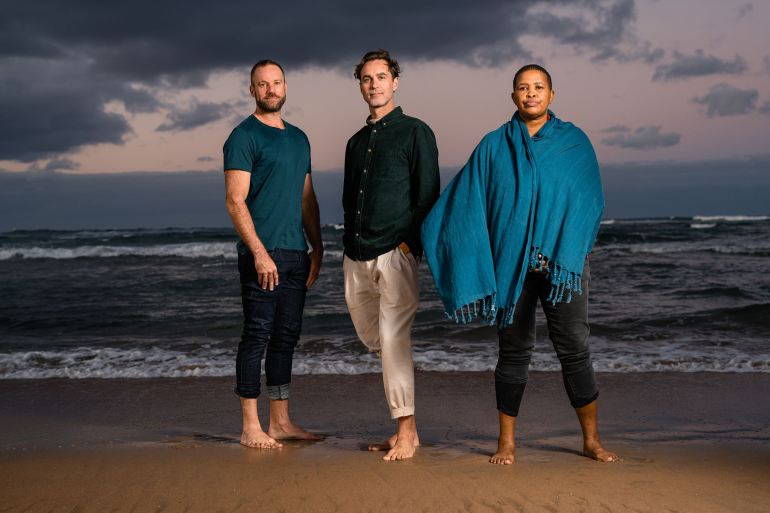South African play revives complex stories of women in apartheid era
Isidlamlilo is a one-woman play about untold angles of the black-on-black violence that engulfed South African townships in the apartheid era.

Johannesburg, South Africa – This August, Isidlamlilo (The Fire Eater), a play about the life of a female apartheid-era assassin in South Africa, goes on the road across Europe.
But on July 19, it premiered in Johannesburg, South Africa’s largest city, by its writers, award-winning South African playwrights Neil Coppen and Mpume Mthombeni of Empatheatre company, based in Durban in the Kwa Zulu Natal (KZN) province.
Keep reading
list of 4 itemsKing Charles unveils royal portrait
Cannes film festival hopes for ‘no controversies’ as wars, scandals rage
Energy summit seeks to curb cooking habits that kill millions every year
Isidlamlilo is a one-woman play rooted in the political, black-on-black violence that engulfed townships of KZN between factions of the African National Congress (ANC) and Inkatha Freedom Party (IFP) in the 1980s and 90s and led to, among other things, the Boipatong massacre in the Gauteng province. The apartheid government backed the IFP, ahead of the country’s first democratic elections in 1994.
From this history emerges the story of Zenzile Maseko (played by Mthombeni), a Zulu grandmother in her sixties in a Durban women’s hostel, haunted by her past working as an IFP assassin. The Department of Home Affairs’ broken system – notorious in the country for its inefficient service delivery – has declared her dead.
Her fight to rectify that mistake is a layered struggle for survival.
As she tells her story, hoping to be redeemed from her violent past, Zenzile is resilient. She has survived an attempt on her life by the avengers of those she had killed. She also survived COVID-19 and the July 2021 riots, a wave of unrest in the KZN and Gauteng provinces after former president Jacob Zuma was sentenced for contempt of court. Similar to the IFP and ANC wars on a smaller scale, the July 2021 riots left 354 people dead.
These incidents largely influenced the writing of Isidlamlilo as a way to examine how the violence of South Africa’s history produced the violent condition of its democracy. The play succeeds in humanising this history and it illuminates the complicated conditions that created a character like Zezile Maseko.

A complex portrait of a grandmother
The play’s producers say it is inspired by the real-life stories of women living in a Durban hostel, part of an oral history project on migration, gender and inclusion by the Urban Futures Centre at the Durban University of Technology which Mthombeni and Coppen were invited to.
“The project collected about 30 oral histories from different women all over Africa. Of those, 10 were from women in the Thokoza Women’s Hostel in Durban. Therein one story stood out. We know about the faction wars between the ANC and the IFP, but we had never heard of women assassins,” Mthombeni said.
She and Coppen interviewed the women as part of their research process for Isidlamlilo.
“The play brings up for me the doctoral work of political science professor Siphokazi Magadla titled Women and War, which conceives of apartheid as an unconventional war. Magadla has also written a book titled Guerrillas and Combative Mothers looking at South African women in the armed struggle from 1961 to 1994,” academic and performance artist Nondumiso Msimanga told Aljazeera.
“In being able to think of apartheid as an unconventional war, we are then able to acknowledge women like Zenzile Maseko as soldiers, guerrilla fighters and combative mothers,” she added. “Zenzile is such an incredible portrait of a guerrilla fighter because she is so complicated. You can’t love her in an easy way.”
“The neglect of these women has created a very particular wound that is continued in our country because they then raise people who are cut off from humanity,” Msimanga said. “This is because combative mothers had to cut off parts of their humanity in order to become soldiers. There’s no recognition for the aftermath of that.”
The life of the play’s main character was further worsened by the undesirable living conditions of Durban hostels poorly designed by the apartheid government for migrant workers.
“Initially they were only meant for men,” Mvuso Ntombela, administrator of Durban’s Hostel Dwellers Association, told Al Jazeera. “Over the years they have come to accommodate women. Women’s hostels are overcrowded. More and more babies born into hostel life are losing their roots. They don’t know any other place. We continue to fight for the equality of hostel dwellers.”
Correcting the erasure of [black] women
The woman whose real-life story inspired the character of Zenzile in the play died shortly before she could see her story immortalised on stage.
“The play is about a woman who believes she can’t die. What’s beautiful and poetic about the fact that her story is in a play just before she passed is that every time it is performed, she lives again. She defies death by having her story told around the world and all over South Africa,” Coppen says.
For audience member, arts researcher and critic Zanele Madiba, this story corrects the erasure of women.
“The role of women has always been erased. It was interesting to see a woman speaking in her own voice and not being spoken about. Somebody fighting to be alive, fighting to say, ‘I’m here, you will not kill me with your broken system’. That stayed with me,” she told Al Jazeera.
For Msimanga, this is a woman she recognises.
“In a Facebook post I wrote about how this is my grandmother. I’m talking about my grandmother’s sister who was a combative woman, who has not been able to speak to people that she has hurt and ask for their forgiveness,” she said.

Transformative impact
Isidlamlilo is one hour and 40 minutes long and Mthombeni holds the attention of the audience with her immersive performance. Coppen holds space for her by infusing Zulu folklore, mythical imagery and ambient sound design for a nuanced and engaging theatre language.
The duo, together with educational sociologist, Dr Dylan McGarry, created Empatheatre in 2014 as a theatre company based on research and engaging with grassroots issues from communities on the ground. The company is the recipient of the 2022 Bertha Artivism Award for their social justice activism driven by empathy.
Isidlamlilo premiered in 2022 at the National Arts Festival, South Africa’s largest international arts festival. It is already a case study for the power of research-based theatre, in a thesis by student Kami Zimmer for the New School for Social Research in New York.
After the Johannesburg run, Isidlamlilo goes to the Noorderzon Festival of Performing Arts in Groningen, Netherlands from 17 to 20 August; The Kampnagel International Summer Festival in Hamburg, Germany from 24 to 27 August; and La Batie-Festival de Geneve in Switzerland from 1 to 3 September.
A return show is in the works for 2024, particularly for the women from the Durban women’s hostels whose stories are represented in the play. The text will also be published in 2024 and possibly become a set work in South African high schools.
The company hosts postshow talk sessions for audiences to share their own stories and reflect. For Nikiwe Mziwakhe, a member of the audience in Johannesburg, the play educated her on a part of South African history she wasn’t aware of.
“This is a history I don’t know much about, but this is a story told in an emotive and comical way,” Mziwakhe told Al Jazeera. “I couldn’t keep my eyes off Mpume Mthombeni. She owned the space and was in tune with the story in accessible ways.”